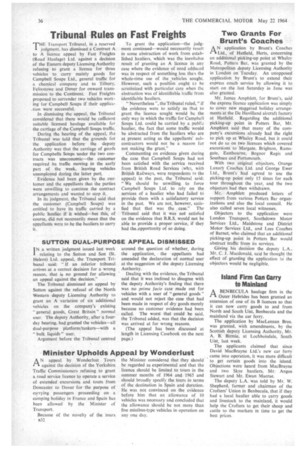Tribunal Rules on Fast Freights
Page 38

If you've noticed an error in this article please click here to report it so we can fix it.
THE Transport Tribunal, in a reserved judgment, has dismissed a Contract A to A licence appeal by Fast Freights (Road Haulage) Ltd. against a decision of the Eastern deputy Licensing Authority refusing to grant a licence for three vehicles to carry mainly goods for Campbell Soups Ltd., general traffic for a chemical company and to Tilbury, Felixstowe and Dover for onward transmission to the Continent. Fast Freights proposed to surrender two vehicles working for Campbell Soups if their application were successful.
In dismissing the appeal, the Tribunal considered that there would be sufficient suitable licensed haulage available for the carriage of the Campbell Soups traffic.
During the hearing of the appeal, the Tribunal was told that the grounds for the application before the deputy Authority was that the carriage of goods for Campbells Soups under the two contracts was uneconomic—the customer required its traffic moving in the early part of the week, leaving vehicles unemployed during the latter part.
Evidence had been given by the ens-tomer and the appellants that the parties were unwilling to continue the contract arrangements and wanted to stop it.
In its judgment, the Tribunal said that the customer (Campbell Soups) was entitled to have its traffic carried by a public haulier if it wished—but this, of course, did not necessarily mean that the appellants were to be the hauliers to carry To grant the application—the judgment continued—would necessarily result in some abstraction of work from established hauliers, 'which was the inevitabte result of granting an A licence in any case where the evidence of need adduced was in respect of something less thal the whole-time use of the ;vehicles sought. However, such a position ought ta be scrutinized with particular care when the abstraction was of identifiable traffic from identifiable hauliers.
"Nevertheless ", the Tribunal ruled, " if the evidence were to satisfy us that to grant the licence sought would be the only way in which the traffic for Campbell Soups Ltd. could be carried by a publiz haulier, the fact that some traffic would be abstracted from the hauliers who are at present acting as the appellants' subcontractors would not be a reason For not making the grant."
Commenting on evidence given during the case that Campbell Soups had not been satisfied with the service received from British Road Services (who, with British Railways, were respondents m the appeal) in the past, the Tribunal said: "We should be unwilling to force Campbell Soups Ltd. to rely on the services of a haulier who had failed to provide them with a satisfactory service in the past We are not, however, satisfied that that was the cast." The Tribunal said that it was not satisfied on the evidence that B.R.S. would not be able to provide a proper service, if they had the opportunity of so doing.




























































































































